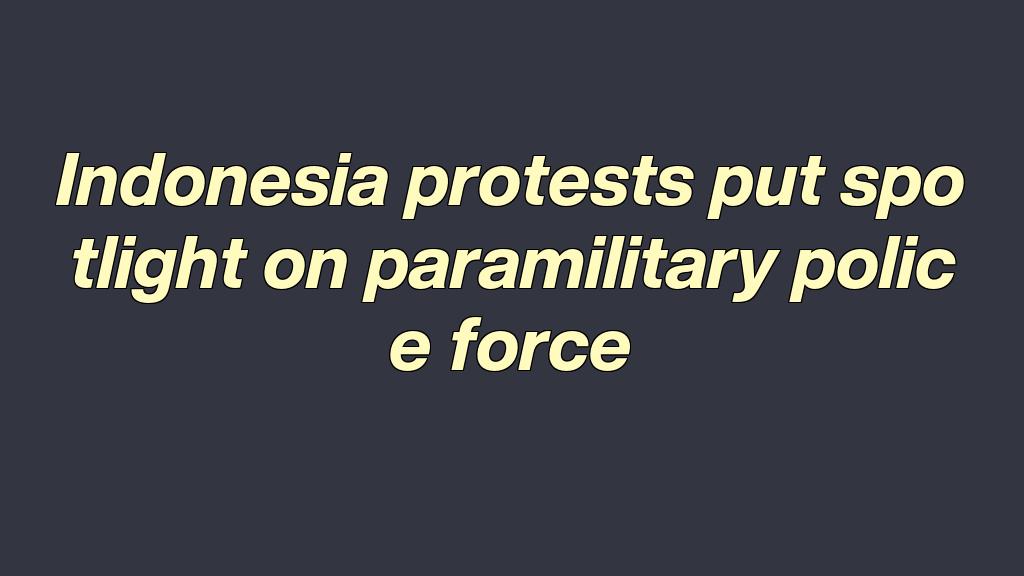JAKARTA — Viral footage of a tactical van crashing into a young delivery driver in Indonesia’s capital before rolling over his body has sparked renewed anger against a police force long known for its heavy-handed tactics.
Seven officers inside the van were detained for violating the police ethics code at the protest against low wages and financial perks for lawmakers, while the president pledged an investigation.
Protests have since erupted across the country over the incident, the latest in a string of cases where Indonesia’s militarized police force — the Mobile Brigade Corps, or Brimob — has been accused of overreaction leading to civilian death.
“Brimob is actually a militaristic police force with their own heavy weapons. It is historically used to deal with armed movements but over the last decade more often assigned to work against street protests,” said Human Rights Watch’s Andreas Harsono.
Indonesia protests put spotlight on paramilitary police force
The unit has therefore “often employed excessive force when dealing with street protests, initially in places like West Papua, but lately also in Jakarta and other urban areas,” he added., This news data comes from:http://gyglfs.com
Brimob has its origins in the Japanese colonial era when it was formed as a special police force, before being turned into a post-independence paramilitary unit used to quell internal rebellions.
It has since crushed radical Islamist groups and anchored the government’s bloody fight against separatists in Papua, Aceh and East Timor.
The Brimob unit has since been used to crush government opponents and even defend financial interests such as plantations and mining operations, activists and experts said.
“They are pretty much involved in several large mass protests to do a crowd control function,” said Dimas Bagus Arya, coordinator of the human rights organization KontraS.
“They have the same credo as the military, which is kill or be killed.”
Indonesia’s national police did not immediately respond to an AFP request for comment.
Stadium disaster
While the protests began over economic conditions, deep-rooted anger against the police has manifested itself on Indonesia’s streets in recent days and amplified the unrest.
On Saturday night, a police headquarters was set on fire in the East Java city of Surabaya with expletives aimed at the force spray-painted on the road.
In 2022, a stadium stampede in East Java left more than 130 people dead after police fired tear gas into the stands after some fans invaded the pitch.

Indonesia protests put spotlight on paramilitary police force
The crush was one of the deadliest disasters in football history.
Only several officers were held and all received light sentences.
Many Indonesians fear a culture of impunity for the police will continue, with close ties between the force and government giving the impression they are intertwined.
“Human rights violations committed by Brimob have almost never been taken into a civilian court of law,” said Amnesty International Indonesia’s Usman Hamid.
“One of the root causes is lack of accountability.”
Some say that without government action to reform the very force many of them worked in, little will change.
“The first thing that needs to be addressed by the president, the government, is to make a roadmap of reform of the police,” said Ardi.
“If not, this means nothing. The masses will always feel disappointed and keep their feeling of revenge towards the police in the future.”
- Israeli strikes in Yemen's capital kill six, Houthis say
- No winner in lotto draws for Aug 28
- Pope Leo's first international trip could be to Lebanon, cardinal says
- India walks back order to clear Delhi of stray dogs
- 10 DPWH execs in Bulacan relieved over ghost flood control projects
- ‘Gomez ignorant of how media works’
- UN watchdog finds uranium traces at suspected Syrian former nuclear site
- Filipino member of AHOF K-pop group says Manila concert a dream come true
- Mexican senators come to blows after heated debate
- Gasoline, diesel prices to increase again next week